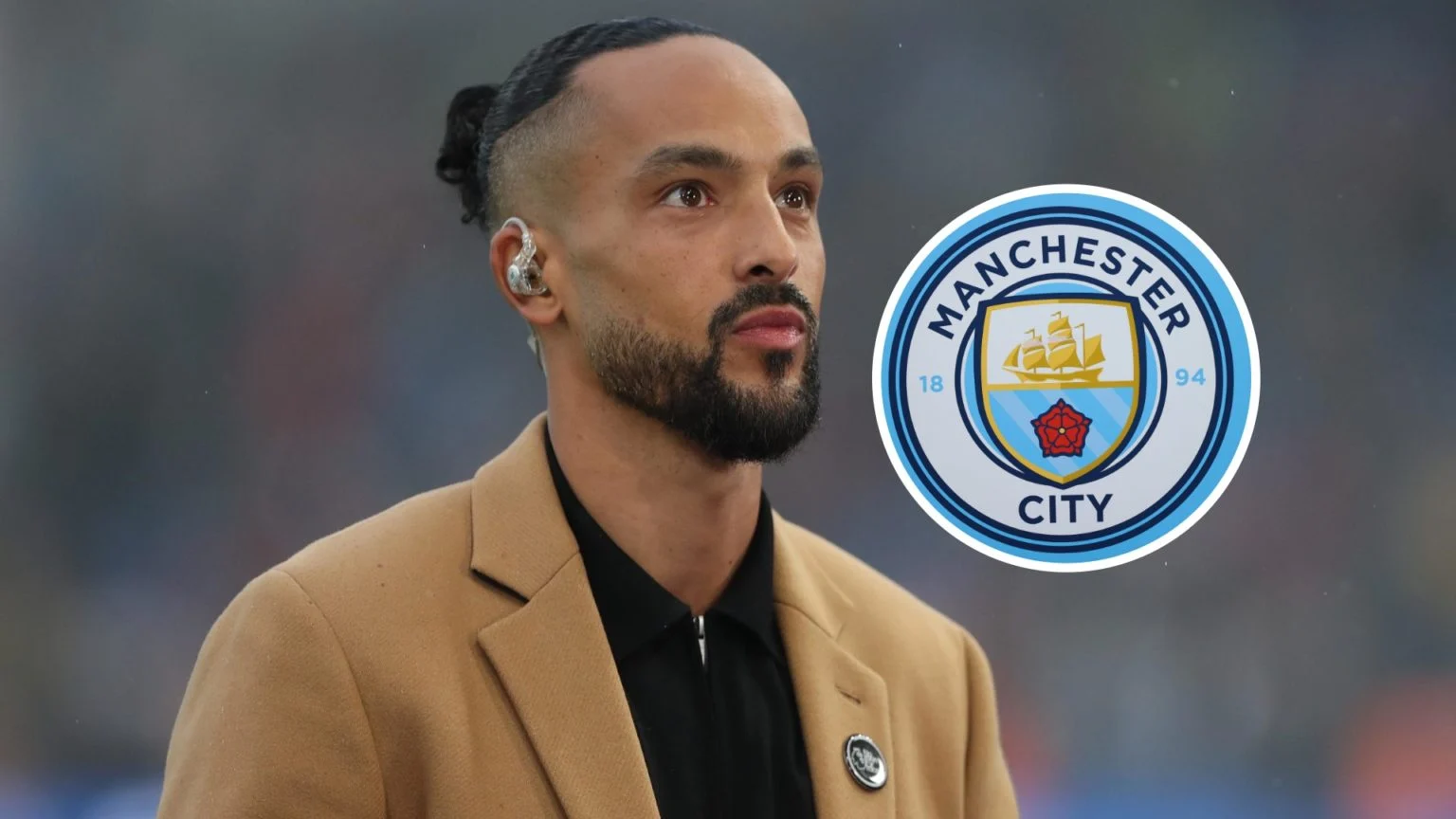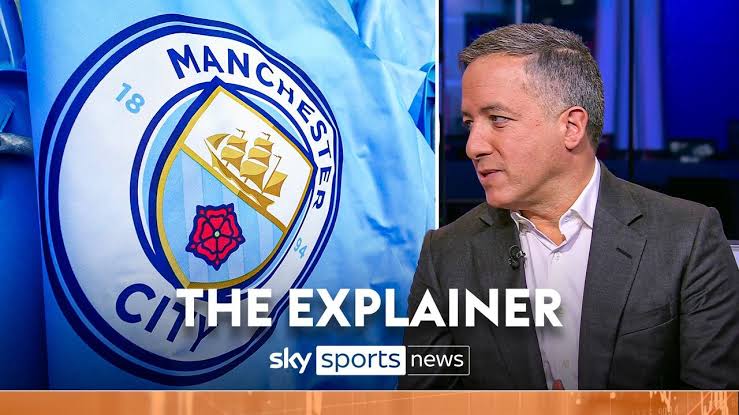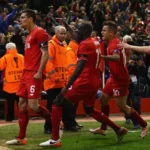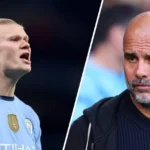Theo Walcott names the Man City player he thinks will usher in the ‘next stage’ at the club

As the summer transfer window approaches, Manchester City find themselves at a crucial crossroads in their illustrious recent history. The team that dominated English football for the better part of a decade under Pep Guardiola’s stewardship is undergoing a significant metamorphosis. The aging core that delivered countless trophies to the Etihad Stadium is gradually making way for fresh blood tasked with maintaining City’s high standards while evolving their style of play for the future.
At the heart of this transition stands a towering Croatian defender who has rapidly established himself as not just a key component of City’s defensive unit, but potentially the cornerstone around which the next great Manchester City team will be built: Josko Gvardiol.
Former Arsenal and England star Theo Walcott recently singled out Gvardiol as the player who will be instrumental in ushering in “the next stage” at the club, highlighting the 23-year-old’s versatility, technical brilliance, and leadership qualities that belie his relatively young age.
“He’s a better finisher than some of these forwards,” Walcott remarked during the Premier League’s Rising Stars show. “You talk about composure, you have to have that now as a centre-back and you have to have that in a Man City team with Guardiola otherwise you’re not going to play.
When Manchester City announced the signing of Josko Gvardiol from RB Leipzig in the summer of 2023 for a fee in the region of £77 million, eyebrows were raised across the football world. The transfer fee made him one of the most expensive defenders in football history, creating immense pressure and expectations for a player who was just 21 years old at the time.
Fast forward nearly two years, and that investment appears increasingly shrewd. Gvardiol has blossomed into one of the Premier League’s standout defenders, displaying a level of adaptation and development that has impressed even his harshest critics.
Walcott’s recent comments further cement Gvardiol’s rising status: “He’s surprised me, he really has, especially the inverted full-backs, it’s one of those where you just don’t know what you’re going to get to be honest. But look, he’s so confident, he’s made that position his own, he really has indeed, a lot of players don’t really get too much success against him.”
What has made Gvardiol’s impact particularly remarkable is his positional flexibility. While primarily signed as a center-back, Guardiola initially deployed him predominantly as a left-back, where he excelled in an inverted role that allowed him to step into midfield and contribute to City’s build-up play. His technical ability, passing range, and comfort on the ball made him a natural fit for Guardiola’s system, where defenders are expected to be as adept in possession as midfielders.
However, recent weeks have seen Gvardiol shift back to his natural center-back role alongside Ruben Dias, forming a partnership that has quickly become one of the most formidable in European football. This tactical adjustment coincided with the emergence of academy graduate Nico O’Reilly, whose performances allowed Guardiola to reshuffle his defensive options.
The partnership between Gvardiol and Dias has quickly developed into something special. The Portuguese international’s experience and leadership complement Gvardiol’s athleticism and technical prowess perfectly. Together, they provide a balanced defensive foundation that combines physical dominance with technical excellence.
According to journalist Simon Bajkowski, this pairing could be Guardiola’s preferred option moving forward: “There is undeniably a quality to the Gvardiol-Dias partnership that may be hard to beat with any other combination.”
What makes this partnership particularly exciting for City fans is its potential longevity. At 27, Dias is entering his prime years as a defender, while at 23, Gvardiol is still developing and has his best years ahead of him. This center-back pairing could potentially anchor City’s defense for the next five to seven years, providing stability during a period of transition.
The statistical improvements in City’s defensive metrics since Gvardiol moved to center-back tell their own story. In the last eight Premier League matches with Gvardiol at center-back, City have conceded just three goals and kept five clean sheets. The team’s expected goals against (xGA) has dropped from 0.9 per game to 0.7, suggesting a more robust defensive structure.
While Gvardiol’s defensive capabilities form the foundation of his game, it’s his contributions in the attacking phase that have truly set him apart from other defenders in the league. His marauding runs from deep, his composure in the final third, and his eye for goal have added a new dimension to City’s attack.
The Croatian demonstrated his attacking prowess most memorably in City’s recent 5-1 dismantling of Wolves, where he scored a stunning goal that had fans comparing him to a seasoned striker rather than a defender. Receiving the ball on the edge of the box, Gvardiol executed a delicate feint to create space before curling a sublime finish into the top corner – the type of goal typically associated with world-class forwards.
This offensive capability is precisely what Walcott was referring to when he said, “He’s a better finisher than some of these forwards.” In a Guardiola system that demands every player contribute to the attacking phase, Gvardiol’s comfort in advanced positions makes him particularly valuable.
His heat maps this season reveal a player who occupies spaces not typically associated with defenders. When playing at left-back, Gvardiol often positions himself in central midfield areas during sustained possession, providing numerical superiority in build-up play and allowing City’s midfielders to push higher up the pitch. Even when deployed as a center-back, he frequently carries the ball into midfield, breaking opposition lines with progressive passes or driving runs.
In terms of raw numbers, Gvardiol has contributed four goals and six assists across all competitions this season – impressive figures for a defender and indicators of his all-around influence on matches.
Gvardiol’s emergence as a key figure comes at a crucial juncture in Manchester City’s evolution under Guardiola. The club stands on the precipice of significant change, with several stalwarts of their dominant era potentially moving on this summer.
Most notably, midfield maestro Kevin De Bruyne appears set to depart after nine trophy-laden years at the Etihad. The Belgian playmaker has been the creative heart of City’s team for nearly a decade, but at 33, he seems likely to pursue a new challenge, with Saudi Arabian clubs reportedly offering lucrative terms to secure his signature.
Goalkeeper Ederson, who revolutionized the position with his exceptional ball-playing abilities, has also been linked with a move away, while versatile midfielder Bernardo Silva continues to attract interest from Barcelona and Paris Saint-Germain. These potential departures represent the gradual dismantling of the core that delivered five Premier League titles in six years.
In anticipation of this transition, City have been proactive in the transfer market, securing young talents who can form the nucleus of the next great City team. Recent months have seen the arrivals of Abdukodir Khusanov, Vitor Reis, Omar Marmoush, and Nico Gonzalez – all highly-rated prospects under the age of 23 who embody the technical and tactical profiles that thrive in Guardiola’s system.
The promotion of academy graduates like Rico Lewis and the aforementioned Nico O’Reilly further underscores this shift toward youth as City prepare for their next chapter.
Despite the changing personnel, Guardiola’s footballing philosophy remains constant. The Catalan coach continues to prioritize positional play, possession dominance, and tactical flexibility. What’s changing is not the system but the interpreters of that system.
The tactical evolution we’re witnessing involves subtle adjustments rather than wholesale changes. Gvardiol’s positional flexibility exemplifies this approach – he represents a new breed of defender who can function effectively across multiple positions and tactical set-ups.
Guardiola’s comments in recent press conferences have hinted at this evolutionary process: “Football is always evolving, and we must evolve with it. The principles remain the same, but how we apply them must adapt to the qualities of our players and the challenges posed by our opponents.”
This philosophy explains why Guardiola is willing to adjust Gvardiol’s position based on team needs rather than rigidly defining him as either a left-back or center-back. As Bajkowski noted: “Guardiola likes his defenders to be fluid, able to play multiple positions so that he can adapt for whatever opposition they face.”
Beyond his tactical importance, Gvardiol’s emergence as a potential leader comes at a time when City will need new figures to step into the void left by departing veterans. With De Bruyne likely leaving and other experienced players like İlkay Gündoğan having already departed, there’s a leadership vacuum that needs filling.
Despite his relative youth, Gvardiol has displayed leadership qualities throughout his career. At RB Leipzig, he was often seen organizing the defensive line and communicating constantly with teammates. These traits have carried over to his time at City, where his commanding presence has grown with each passing month.
Former City defender Micah Richards recently commented on this aspect of Gvardiol’s game: “What impresses me most about him is his maturity. He plays like someone with 300 Premier League appearances under his belt, not someone who’s relatively new to English football. He’s vocal, he organizes, and he leads by example – that’s rare for a defender his age.”
This leadership quality is undoubtedly part of what Walcott was referring to when he highlighted Gvardiol as key to developing “the next stage of that generation” at City. As one of the first major signings of City’s new cycle, Gvardiol carries the responsibility of setting standards and embodying the club’s ethos for newer arrivals.
The parallels between Gvardiol’s current trajectory and that of City legend Vincent Kompany are difficult to ignore. Kompany arrived at City as a young, versatile defender who initially split time between defensive midfield and center-back before establishing himself as the cornerstone of City’s defense and ultimately the club captain who led them to their first Premier League title.
While it’s premature to suggest Gvardiol will achieve the same legendary status, there are striking similarities in their development patterns. Both possess exceptional technical ability unusual for defenders of their physical presence. Both demonstrate leadership qualities beyond their years. And both arrived at City during periods of transition, quickly becoming integral to the team’s evolution.
Interestingly, Kompany himself – now making waves in management after winning the Bundesliga with Bayern Munich – has spoken highly of Gvardiol, describing him as “the complete modern defender” and suggesting he has “all the attributes to become one of the world’s best.”
To understand why Guardiola and City value Gvardiol so highly, it’s worth examining the specific technical and tactical attributes that set him apart from other defenders.
First, his passing range is exceptional. Gvardiol consistently ranks among the Premier League’s top defenders for progressive passing metrics, completing an average of 7.2 progressive passes per 90 minutes. His ability to break lines with incisive forward passes enables City to transition quickly from defense to attack.
Second, his ball-carrying ability adds another dimension to City’s build-up play. Gvardiol averages 1.4 successful dribbles per 90 minutes – a figure that places him in the 95th percentile among defenders in Europe’s top five leagues. This ability to carry the ball forward relieves pressure and creates numerical advantages in midfield areas.
Third, his defensive fundamentals remain solid despite his technical flair. Gvardiol wins 67% of his aerial duels and 64% of his ground duels, demonstrating that his attacking contributions don’t come at the expense of defensive solidity.
Finally, his spatial awareness and tactical intelligence allow him to anticipate danger and make crucial interventions. He averages 2.3 interceptions per 90 minutes, often cutting out attacks before they develop into serious threats.
These combined attributes create a defender perfectly suited to Guardiola’s system – one who can defend reliably while contributing significantly to the team’s offensive patterns.
City fans have quickly taken to Gvardiol, with his jersey becoming one of the bestsellers at the club shop. His combination of defensive solidity, attacking flair, and obvious passion for the club has endeared him to the Etihad faithful.
Social media reactions to his performances tell the story of a player who has captured the imagination of supporters. After his spectacular goal against Wolves, “Gvardiol” trended on Twitter with fans comparing him to attacking players and creating memes about his finishing ability.
City fan groups have also created chants dedicated to the Croatian, with one popular refrain adapting the melody of “Freed from Desire” to celebrate Gvardiol’s marauding runs from defense.
This rapid embrace by the fanbase provides Gvardiol with the platform and support needed to grow into his role as a team leader, much as the fans’ adoration helped elevate Kompany from promising defender to club icon.
While Gvardiol’s trajectory appears overwhelmingly positive, challenges remain as he continues his development at City. The physical demands of English football, particularly during the congested winter schedule, will test his durability and consistency. Additionally, as his reputation grows, opponents will increasingly analyze his tendencies and attempt to exploit any weaknesses in his game.
The departure of experienced players like De Bruyne will also place additional responsibility on younger players like Gvardiol to maintain City’s high standards during this transition period. How he handles this increased pressure could define his legacy at the club.
However, these challenges also present opportunities for growth. With Guardiola committed to the club for at least another season, Gvardiol will continue to benefit from coaching from one of football’s greatest tactical minds. The arrival of new technical director Hugo Viana from Sporting Lisbon also signals a commitment to building a squad that can sustain success while evolving stylistically.
Conclusion
As Manchester City prepare to bid farewell to key figures from their golden era, the emergence of Josko Gvardiol as a potential cornerstone for their next chapter provides optimism that the transition will be smooth rather than turbulent.
Walcott’s assessment that Gvardiol will be “key for Man City to develop the next stage of that generation” appears increasingly prescient as the Croatian continues to excel in whatever role Guardiola assigns him.
The true measure of Gvardiol’s impact, however, will come in the seasons ahead. If City can navigate this period of transition while maintaining their competitive edge domestically and in Europe, much credit will belong to players like Gvardiol who bridge the gap between City’s glorious recent past and their ambitious future.
As the summer transfer window approaches and the inevitable changes begin to take shape, City fans can take comfort in knowing that in Josko Gvardiol, they possess a rare talent – a defender who combines the technical brilliance Guardiola demands with the leadership qualities needed to guide the team through its evolution.
The Gvardiol era at Manchester City is just beginning, but already the signs suggest it could be just as successful as what came before.















